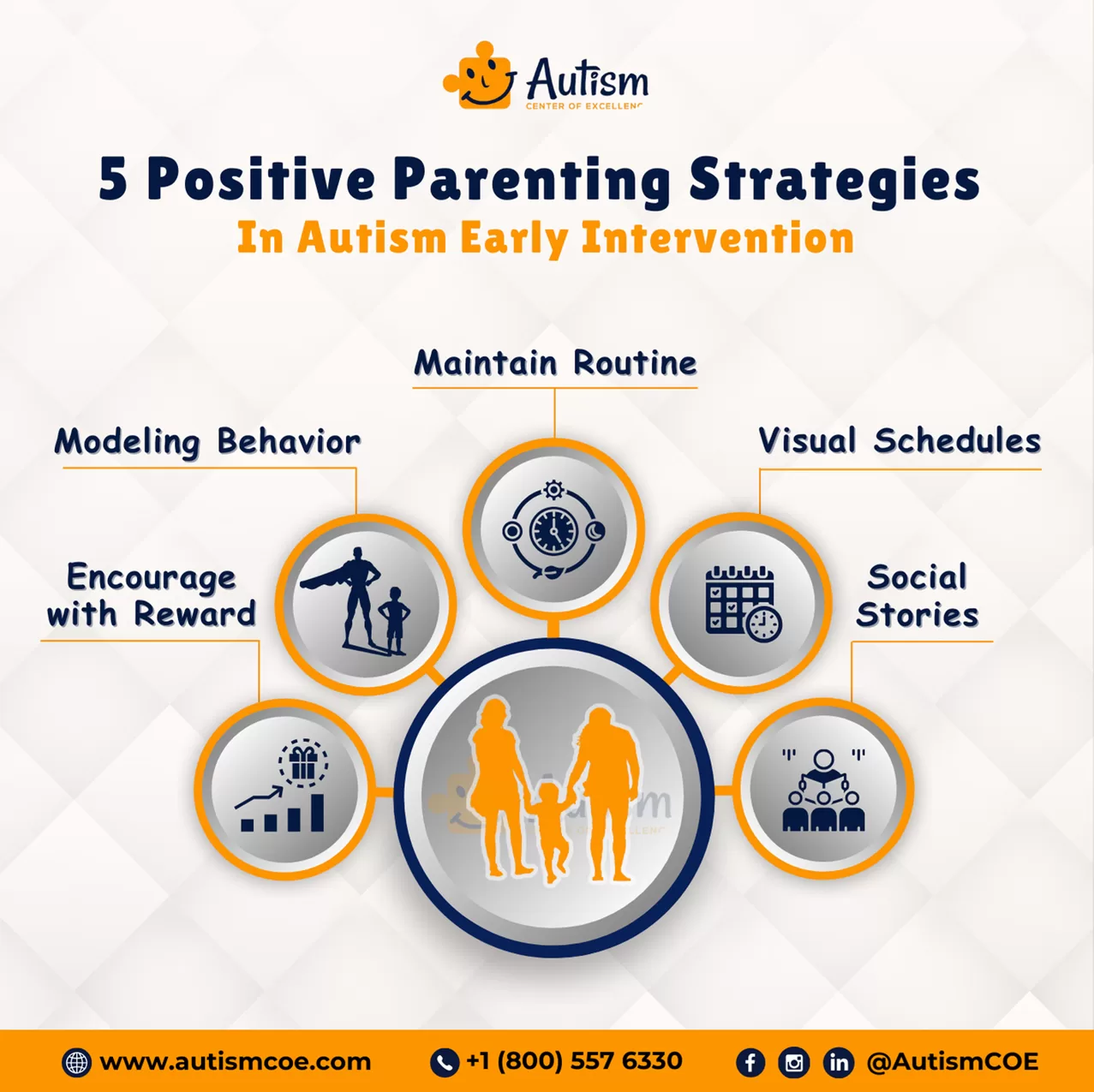Unit 28: Connection Between Early Intervention Programs and Improved Parenting Skills

Imagine you’re on a treasure hunt, and every clue you find leads you closer to a big, shiny prize. That’s a bit like what early intervention programs are for families with children with autism. These programs are like clues that help parents unlock better ways to connect and communicate with their children. And guess what? The prize at the end is improved parenting skills and a happier family life!
Early Intervention is not only an aid but also a magical tool that changes the parenting experience, especially when dealing with children on the autism spectrum. It is as if one has a magical map that guides families toward their destination of understanding, growth, and joy. Let’s see how these programs do their magic!
The Early Intervention Programs
Early Intervention Programs are designed to Support Young Children with developmental delays or disabilities, including autism. They focus on providing tailored support that meets the unique needs of each child and their family. Think of it as having a special toolkit filled with strategies and techniques to help kids learn and parents grow. These programs are often family-centred, meaning they work closely with parents to ensure everyone benefits.
How Early Intervention Improves Parenting Skills
Early intervention programs are specially crafted to help young children with developmental delays or disabilities, such as autism. These Autism Early Intervention Programs focus on creating a unique plan that fits the needs of each child and family. It’s like having a special toolkit packed with strategies to support both kids and their parents as they learn and grow together.
These programs are often family-centered, meaning they work closely with parents to ensure everyone benefits from the experience. By being a part of this journey, parents can see parenting skills improve as they learn new ways to connect with their children and help them thrive. It’s a collaborative effort that strengthens the family bond and supports each child’s development.
What is the Parent Intervention Program?
Parent intervention programs are designed to teach parents specific techniques and strategies that can be used in everyday interactions with their children. These programs are like personalized coaching sessions where parents learn about autism, how it affects their child, and ways to support their child’s growth.
In these programs, parents discover how to use play and daily routines to teach important skills and how to create a nurturing environment that encourages their child’s development. It’s about turning everyday moments into learning opportunities, making life a classroom where both parents and children learn together.

Evidence-Based Parenting Interventions for Children with Autism
When it comes to helping children with autism, using evidence-based approaches is like following a reliable recipe that guarantees success. These positive parenting strategies in autism early intervention program are designed to target effective assistance to both children and their families. Below is a list of some evidence-based parenting interventions with children who have autism, explained in accessible examples and applications:
Encouragement with Rewards
Think of how you feel when you score a goal in soccer and your teammates yell your name. Well, that’s similar to positive reinforcement! So, the next time your child does something great, such as saying “thank you,” reward them with a sticker or extra playtime to ensure they want to do it again.
Demonstrating Actions
Think about learning to tie your shoes by observing the actions of someone else. That’s modeling behavior. If you’d like to teach your child to say “hello” to others, make sure you do it often in front of them. It’s teaching by example, much a friendly game of copying!
Creating a Predictable World
Just like knowing when to do homework or dinner by following a daily routine, an orderly environment will give the child a sense of security. Routine is what gives your child an idea of what to expect during the day to keep them safe and confident.
Guiding with Pictures
Visual Supports are in the form of treasure maps that indicate every step along the way. Many activities, such as dressing or brushing teeth, can be guided by pictures or charts. It’s like giving them a comic strip that will reveal what happens next to make it easier to follow.
Storytelling for Social Learning
Social stories are little books explaining how and what to do in certain situations. For example, if you are taking your child to another person’s birthday party, you might explain the story of how to greet friends or how to play games at someone’s birthday party. It will help kids better internalize social cues and not feel anxious about new places.
You will adopt these parenting intervention examples in your daily life, not only by teaching new skills to your child but also by simplifying and supporting your child’s world. Every strategy brings you closer to a bright, connected future with your child.
A Closer Look at ABA and Evidence-Based Programs
Applied Behavior Analysis, or ABA, is an effective teaching method for any Child Diagnosed with Autism. In short, it is like having a personal coach designed to create activities to teach new skills and improve behavior. This is done by breaking work tasks into small steps that focus on teaching each step in an orderly manner.
ABA programs have been planned for every child’s need in a manner that makes learning fun and engaging. Parent participation in the process has also been arranged so that parents learn to apply these techniques at home. Participation is important since it ensures that the learning process does not stop at the end of a session but continues throughout daily life.
Skill Building
ABA Therapy offers a foundation to acquire several skills significant to sustaining personal growth and independence, such as effective communication, social interaction, and everyday living.
Behavior Management
ABA is also an important Behavior Management tool since it equips individuals with the knowledge of their preferred alternative behaviors, thus avoiding reinforcing undesirable actions and ensuring positive interactions and experiences in most cases.
Enjoying Reading?
Join Our Weekly Newsletters!
Subscribe now to stay updated with our latest email updates.
Why Parent Coaching is Important in Autism Early Intervention
Parent coaching plays a pivotal role in the success of early intervention programs for children with autism. These programs are designed to Address Developmental Delays early in life, and parents are essential partners in ensuring that the interventions extend beyond therapy sessions and into daily routines. Empowering parents with the right tools, strategies, and confidence creates a more consistent and supportive environment for the child’s growth. Below are key reasons why parent coaching is critical in autism early intervention:
1. Extends Learning Beyond Therapy Sessions
Therapy sessions are typically limited to a few hours a week. However, children with autism benefit most from consistent reinforcement of skills throughout the day. Parent coaching ensures that caregivers can:
➡️ Use intervention strategies during routine activities (e.g., mealtime, play, bath).
➡️ Reinforce targeted behaviors and communication skills in natural environments.
By practicing therapeutic techniques at home, parents help their children apply skills across multiple settings, which leads to better outcomes.
2. Empowers Parents and Reduces Stress
Caring for a child with autism can be overwhelming, especially without proper guidance. Parent coaching provides:
⭐ Practical skills to handle challenging behaviors and communication difficulties.
⭐ Emotional support and education, reducing parental stress and burnout.
⭐ A sense of confidence and control as parents understand how to respond effectively to their child’s unique needs.
When parents feel empowered, they can better support their child’s progress, contributing to a healthier family dynamic.
3. Promotes Child-Parent Bonding
Parent-child interactions are crucial for a child’s emotional and social development. Parent coaching:
👉 Teaches play-based techniques to enhance engagement and social connection.
👉 Encourages positive reinforcement, fostering trust and emotional security.
👉 Helps parents understand their child’s behaviors and communication patterns, strengthening their relationship.
This improved connection provides a foundation for the child to feel safe and motivated to learn new skills.
4. Tailored Interventions for Unique Needs
Every child with autism is different, and parent coaching offers a personalized approach:
➡️ Coaches work with parents to identify goals that align with the child’s strengths and challenges.
➡️ They provide individualized strategies that suit the child’s learning style and the family’s routines.
➡️ Adjustments are made over time based on the child’s progress, ensuring the intervention evolves with the child’s needs.
This collaborative approach ensures that the intervention plan is not only effective but also realistic for the family to implement.
5. Improves Long-Term Outcomes
Research shows that early intervention can significantly improve a child’s cognitive, language, and social skills. Parent coaching:
🚀 Ensures that progress continues beyond structured therapy sessions, resulting in more sustainable outcomes.
🚀 Helps parents become advocates for their child’s development in school and community settings.
🚀 Builds lifelong skills for managing autism-related challenges as the child grows.
By empowering parents to take an active role in early intervention, coaching lays the foundation for long-term success.
Frequently Asked Questions & Answer
What are the Benefits of Early Intervention for Children and Families?
Early intervention provides individualized support that fosters the learning and growth of a child, which encompasses the reinforcement of family ties. These early intervention programs for autism lead to the faster attainment of basic skills by the children and foster communication, creating a more tolerant home environment. Effective strategies for child growth development are also learned, as well as the development of parents’ confidence in parenting skills.
What are the Potential Drawbacks of Early Intervention?
While early intervention may be effective, it requires many families since it is demanding in terms of time and commitment and involves coordinating schedules. For example, families are stressed by the intensity or number of sessions conducted in a short period. However, these challenges can be minimized with adequate preparation and support from professional people.
What is the Primary Objective of Family Interventions?
The ultimate aim of family interventions is to establish an environment that promotes the development of a child while helping the family improve itself. Family-centered early intervention builds parents’ competency for raising their children and ultimately results in changes in the whole family.
How Does Parental Involvement Impact a Child's Success?
This is where parental involvement plays an important role in repositioning the child by reinforcing his skills learned in early intervention sessions. In a scenario where they are involved in the activity, the child goes on to make improvements in communication, behavior, and social interaction. Outcomes are, therefore, much better and significantly enhance the potential of success for a child in early intervention programs.
Conclusion
Early intervention programs act as beacons to families exploring the complexities of autism. Such programs serve to offer tools and insights towards the improvement of parenting skills and family dynamics. Our early intervention programs, consisting of Center-Based ABA Therapy and In-Home ABA Therapy here at Autism Center of Excellence, help create an environment that not only promotes parental skills but also leads to better outcomes for children who have autism.
Just remember, no matter the situation, any family can start their journey to success and happiness through the right support and guidance. So keep exploring and learning because every single moment of your child’s life is a great opportunity for both to grow together.
Please Note: The content of this blog is for informational purposes only and should not be considered a substitute for professional medical advice, diagnosis, or treatment. Consult a qualified healthcare professional for personalized guidance tailored to your specific situation.

Bhavika Bhasin
Bhavika Bhasin is the Research and Marketing officer at AutismCOE. She works with children and adults with ASD. Her clinical research includes evaluating various available autism screening and diagnosis methods and their efficacy. She is currently developing a novel screening exam that is indicated to be more accurate than the existing available exams. She is also writes articles papers for various publications.

